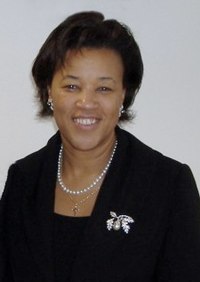Commonwealth Secretary-General
| Secretary-General of the Commonwealth of Nations |
|
|---|---|
| Style | Her Excellency |
| Appointer | Commonwealth Heads of Government |
| Term length | Four years renewable once |
| Inaugural holder | Arnold Smith |
| Website | thecommonwealth |
The Commonwealth Secretary-General is the head of the Commonwealth Secretariat, the central body which has served the Commonwealth of Nations since its establishment in 1965, and responsible for representing the Commonwealth publicly. The Commonwealth Secretary-General should not be confused with the Head of the Commonwealth, who is currently Queen Elizabeth II.
The position was created, along with the Secretariat itself, after the fourteenth Commonwealth Prime Ministers Conference in London in 1965, issued a memorandum describing the role of the Secretary-General:
The headquarters of the Secretary-General, as with the Secretariat generally, is Marlborough House, a former royal residence in London, which was placed at the disposal of the Secretariat by Queen Elizabeth II. However, as the building cannot house all of the Secretariat's staff in London, additional space is rented elsewhere in London. From this operational base, a large part of the Secretary-General's work involves travelling around the Commonwealth keeping in personal contact with those at the heart of the governments of member states.
The Secretary-General receives a salary of nearly £160,000 (2015) and a four‑storey mansion in Mayfair as their official residence.
The Secretary-General leads the Commonwealth Secretariat, and all Secretariat staff are responsible and answerable to him or her. He or she is supported by three Deputy Secretaries-General, which are elected by the Heads of Government via the members' High Commissioners in London. Currently, the three Deputy Secretaries-General are Deodat Maharaj, Gary Dunn and Josephine Ojiambo. Until 2014, only two Deputy Secretaries-General were appointed along with an Assistant Secretary-General for Corporate Affairs. The Secretary-General may appoint junior staff at his own discretion, provided the Secretariat can afford it, whilst more senior staff may be appointed only from a shortlist of nominations from the Heads of Government. In practice, the Secretary-General has more power than this; member governments consult the Secretary-General on nominations, and the Secretary-General has also at times submitted nominations of his own.
...
Wikipedia

